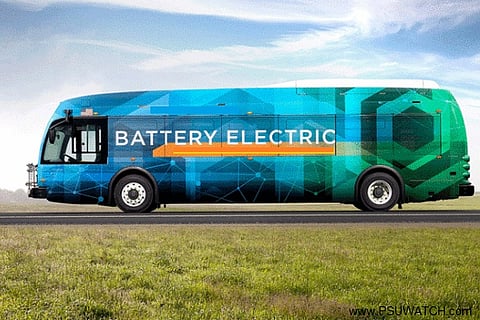
- News Updates
- PSU Watch
- Defence News
- Policy Watch
- हिन्दी न्यूज़
- Jobs Watch
- States News
- Event News

New Delhi: The sale of electric buses (e-buses) is expected to increase four-fold by FY22, a report published by JMK Research recently said. "By March 2020, about 1,031 e-buses were sold across different states and transport undertakings. As per JMK Research estimates, additional 1,850 buses are likely to be sold in FY2021 and around 4,640 units in FY2022," the report said. While noting that the biggest challenge holding back the expansion of the environment-friendly mode of transport is the lack of charging infrastructure, the report said that it is important to plan and develop smart bus depots with efficient depot management system in order to push the adoption of e-buses.
There is a tremendous underlying opportunity for effective delivery of road transport services in India. The advent of e-buses will pave the way for future of efficient mass public transport system. Apart from being cleaner and greener, the major advantage of an e-bus is its extremely low operational and maintenance (O&M) expenditure per unit km. The Total Cost of Ownership (TCO) of e-buses is 10-20 percent lesser than that of diesel buses, said the report.
The e-bus market growth is fuelled by more than US$1 billion worth of investment deals forged in the past few years with investors of varied business backgrounds. To keep up with the pace of e-bus induction and deployment on public roads, the charging systems and allied-infrastructure must also be enhanced and/or developed systematically to overcome local-specific challenges.
One of the critical challenges hampering the growth of e-bus charging infrastructure in India is the lack of clarity in the role and extent of responsibilities assigned to the state or city transport authority and bus operators with regard to setting up of charging stations under the Gross Cost Contract (GCC) model, said the report. As per this Public Private Partnership (PPP) model, the contracted operator or the supplier manages the O&M aspects of e-bus service. The supplier is remunerated on the basis of a fixed cost per km.
"Due to this issue, there is a potential imposition of significant operational and safety risks on both the parties post the commencement of charging service," said the report.
A vast majority of city bus depots across all states face hindrances in accommodating charging systems in their allotted spaces as these depots were not planned to dock e-buses or facilitate charging service. Thus, it is highly important to plan and develop smart bus depots with efficient depot management system that can manage multiple conventional and electric buses optimally, said JMK Research.
Closely linked to the depot design dilemma is the challenge of limited capacity of power connection to existing depots or bus stops to cater to e-bus charging requirements. The slow and fast chargers typically provide 50 kW and 150 kW service power respectively. So, in order to facilitate uninterrupted charging service, the bus terminal or depot must have about 1 MW or more capacity electricity connection. This implies that the concerned transport authorities need to work in coordination with the discoms for electrification of bus depots.
(PSU Watch– India's Business News centre that places the spotlight on PSUs, Bureaucracy, Defence and Public Policy is now on Telegram. Join PSU Watch Channel in your Telegram and stay updated)
